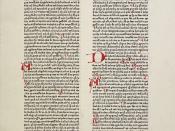In recent work on the philosophy of religion, there has been a great deal of concentration on what John Hick, in his Philosophy of Religion calls "the peculiarity of religious language". Hick is referring to the fact that when language is used either to describe God, or to make any kind of religious statement, it is used in ways that quickly reveal difficulties of meaning. These problems have to do with the fact that while religious statements seem to have all the authority of factual statements, it is quite clearly not possible to regard them as actually being equivalently authoritative.
Examples:
1. Jesus loves Kyle and Jim. Kyle loves Jim.
2. "God has ordered me to do this"
3. My father has ordered me to stay in tonight
In the case of statement 1, it would be straightforward to discover evidence for or against the truth of the statement that "Kyle loves Jim".
If one could listen to their private conversations in class, for example, it would not be difficult to interpret the affection of Kyle for Jim. Let us suggest that if Kyle were ill or upset, Jim's conduct towards him would demonstrate his love.
We could go on with this list and lengthen it considerably. It would surely be rather more difficult to provide similar validation of the statement that "Jesus loves Kyle and Jim", for, in attempting to do so, one would need to address such intractable questions as these:
Examples:
- How would we go about demonstrating either the truth or the falsity of this statement?
- If Kyle said that he did not believe it was true and Jim said that he did, who would be speaking the truth?
- If the roof were blown off their house in a terrible storm, would this...


